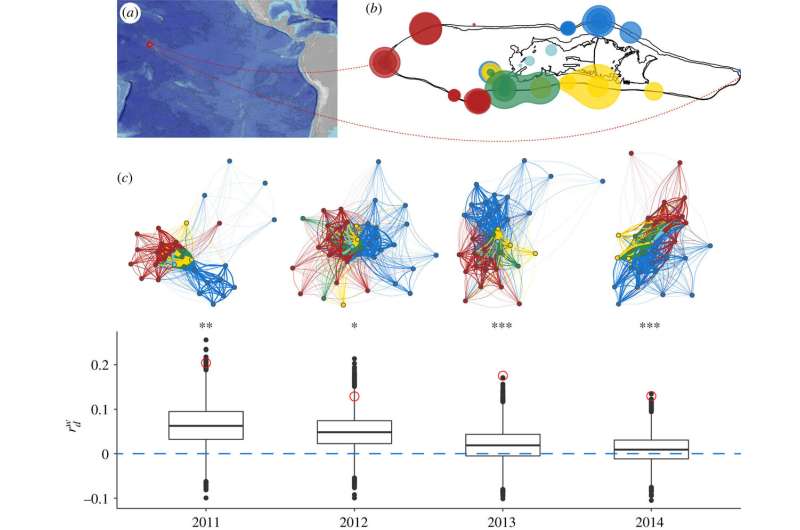August 12, 2020 report
Grey reef sharks found to exhibit social behavior

A team of researchers affiliated with multiple institutions in the U.S. and the U.K. has found that gray reef sharks exhibit a form of social behavior. Their paper is published in Proceedings of the Royal Society B
Gray reef sharks are often seen in the Indo-Pacific. They are normally observed by humans near coral reefs. They can generally be recognized by their plain, white-tipped dorsal fin. Prior research has shown that they are central place foragers, which means they base themselves around a given spot in the ocean during the day and then return to it after foraging in other areas at night. Prior research has also shown that gray reef sharks do not use shelter of any kind, and they never stop moving. They also do not care for their young. These traits suggest that gray reef sharks, like other sharks, are likely loners. In this new effort, the researchers found evidence that despite their behavior, gray reef sharks do bond to a certain degree with others of their kind.
The work involved studying data from a prior investigation in which they had tagged 41 of the sharks and monitored their behavior over the years 2011 to 2014. They returned to the data from that study and also built models to help them see what the data was telling them.
After studying data describing individual shark movements and comparing it with other sharks in the same area that were also being monitored, the researchers were able to separate the sharks into communal groups—those who had home bases that were close to one another. In so doing, they found that the sharks formed a "fission-fusion society," where core members of a group were consistently changing. They also found that while the sharks they studied interacted with sharks in other communities, it was almost always random and weak, compared to interactions with those in their own community. They further found evidence of individual sharks forming associated pairs—some of which lasted for the entire duration of their data period. They noted that such associations were generally based on a form of assistance during foraging; if one saw the other grab a fish, it went to the same location to fish itself, increasing its odds of successful foraging.
More information: Yannis P. Papastamatiou et al. Multiyear social stability and social information use in reef sharks with diel fission–fusion dynamics, Proceedings of the Royal Society B: Biological Sciences (2020).
Journal information: Proceedings of the Royal Society B
© 2020 Science X Network



















